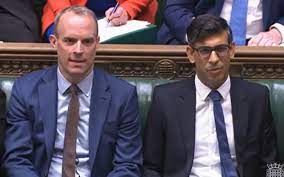David Frost
I’m not here to defend Nadhim Zahawi. I’m here to look at what his brutal political execution last weekend tells us about how Sir Laurie Magnus carried out his duties as the Prime Minister’s new ethics adviser. The Ministerial Code and guidance say that Sir Laurie has a role in “advising” the Prime Minister about adherence to the code.
It is the Prime Minister who “determines” whether a breach has occurred, and who may ask Sir Laurie for “confidential” advice on the appropriate sanction. It is crystal clear that the decision on whether a minister remains in office is for the Prime Minister.
Sir Laurie’s January 29 letter to the Prime Minister pushes this to the limit. He doesn’t advise. He “considers” there has been a “serious failure to meet the standards set out in the Ministerial Code”. His final sentence concludes: “My overall judgment [is] that Mr Zahawi’s conduct as a minister has fallen below the high standards that, as Prime Minister, you rightly expect from those who serve in your government.” That doesn’t leave the Prime Minister a lot of choice. It isn’t advice. It’s Sir Laurie’s judgment – take it or leave it. And his parting words hardly allow any room for “confidential” advice about the “appropriate” sanction. Only one outcome is possible.
Now, maybe this time round this suited the Prime Minister, who, not having acted decisively the first time round, was looking for a way to move Mr Zahawi out. But a precedent has been set. The Prime Minister effectively outsourced this decision. It wasn’t Rishi Sunak who “determined” whether the breach of standards had happened: it was Sir Laurie. It won’t be easy to roll this back even if the next case is much more ambiguous. Gradually, the Prime Minister’s right to determine the members of his own government, and defend them, is being eroded. Unfortunately this is part of a pattern – and not just with the current government. All sorts of decisions are outsourced to supposedly neutral experts. Regulating the City? Leave that to the regulators and keep the elected government out. Want to change fiscal policy? Only if the Office for Budget Responsibility says you can. Pay rises for nurses? Leave that to the pay review bodies. Or, most absurdly, do you think there is a problem with English football? Then bring in an independent regulator to tell them how to run things.
This happens because too many people believe that independent figures do things better. Many people now seem to hold the Institute for Government’s world view, that all kinds of judgments are best made by an official caste of Platonic guardians, people who know best and intuitively understand the correct standards – a new establishment setting the tone just as the old one did. I’m sure readers can see the obvious problem with this. It’s that independent figures and bodies do not come down untouched from on high. They have their own views and those are generally the conventional wisdom of our society. Unfortunately, that conventional wisdom nowadays is highly collectivist and highly judgmental regarding “woke” values.
So when our regulators take decisions, you will find all kinds of unexamined assumptions about the right distribution of income in society, how to improve social inclusion, or even just how best to live your life. When it’s a question of standards, it is a brave minister who will feel happy in letting the great and the good decide whether they were guilty of “inappropriate or discriminating behaviour” (paragraph 1.2 of the Ministerial Code) or had taken a decision “without discrimination or bias”. This isn’t just a theoretical question. There is, of course, another ongoing inquiry – the investigation by the barrister Adam Tolley into the bullying allegations against Dominic Raab.
If this investigation was intended to take the heat out of the question, it has clearly failed. It has allowed any civil servant with any animus against the Justice Secretary to pile in to this secret process, prolonging it for who knows how long and creating a sense of “no smoke without fire”. Certainly the Prime Minister and the No 10 machine are not exactly rushing to defend Mr Raab. I don’t know whether Mr Raab is a bully, and neither do you. So a lot rests now on Mr Tolley’s ability to assess the evidence and be careful about value judgments that not everyone may share. The definitions applied by Civil Service HR may not be ones that others would endorse, and Mr Raab may want to defend himself accordingly. One person’s bullying is another’s determination to get the job done. And after all, government is serious. It isn’t a game or a play. The actions of officials who work in it affect many people’s lives and sometimes even the honour and reputation of the country. Personally, I think they should feel under pressure to do their jobs properly.
The truth is that you can’t take the politics out of politics. Outsourcing decisions just allows others to shape them – and sometimes take them for you. The most successful governments are those which work out what the right action is and get on with it. That’s what we need to see more of.







